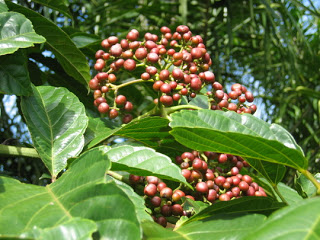These 5 tropical plants may 'provide anticancer benefits'

[Edited By: News Plus]
Wednesday, 29th May , 2019 11:21 am
Analysts from the National University of Singapore, Department of Pharmacy (NUS Pharmacy) went through 3 years examining the pharmacological properties of neighbourhood plants.
They found that three species were especially compelling at hindering the development of a few tumours, and they have now distributed their discoveries in the Journal of Ethnopharmacology.
In spite of the across the board utilization of present-day prescription in Singapore, there is a convention of utilizing neighbourhood plants to treat different conditions, including malignant growth.
The disease is the ebb and flows driving reason for death in Singapore, where 1 out of each 4–5 individuals build up the condition eventually in their lives.
A 2017 report by Singapore's Health Promotion Board expressed that the number of individuals who get a disease analysis will keep on rising, yet that the number of individuals who endure will likewise increment as medicinal innovation and malignant growth care improve.
Southeast Asian nations, including Singapore and Malaysia, are experiencing fast urbanization that is changing their scene and culture. Since there is an absence of logical proof around the restorative properties of nearby plants, the NUS Pharmacy group perceived an earnest need to report any medical advantages these plants may give before the learning is lost.
Proof of anticancer advantages in 5 plants
The group concentrated on seven plants that individuals have utilized as conventional prescriptions for malignant growth. They were:
- Bandicoot Berry (Leea indica)
- Sabah Snake Grass (Clinacanthus nutans)
- Fool's Curry Leaf (Clausena lansium)
- Seven Star Needle (Pereskia bleo)
- Black Face General (Strobilanthes Crispus)
- South African Leaf (Vernonia amygdalina)
- Simple leaf Chastetree (Vitex trifolia)
In the investigation, the group arranged concentrates of "crisp," "sound," and "develop" leaves from these plants and inspected their consequences for cells from bosom, ovarian, uterine, cervical, leukaemia, liver, and colon diseases.
Bandicoot Berry, South African Leaf, and Simple leaf Chastetree had an anticancer impact against each of the seven sorts of malignancy, as indicated by the analysts. Trick's Curry Leaf and Black Face General likewise had defensive properties against some malignant growth cells.
Strikingly, the group found that Sabah Snake Grass was not successful at averting the development of carcinogenic cells, regardless of numerous individuals with malignant growth in the locale utilizing it.
The creators speculate that individuals ordinarily use Sabah Snake Grass as a customary drug since it offers some sort of advantage to individuals with malignancy other than murdering carcinogenic cells.
Implications for new cancer therapies
"Restorative plants have been utilized for the treatment of assorted infirmities since old occasions," says lead study creator Koh Hwee Ling, "however their anticancer properties have not been all around contemplated."
"Our discoveries give new logical proof to the utilization of conventional herbs for disease treatment, and make ready for the improvement of new restorative specialists."
Koh Hwee Ling
Koh and partners include that further research is required to recognize the dynamic intensifies that furnish the anticancer impacts related to these plants. They likewise alert against individuals with malignant growth endeavouring to self-cure utilizing these plants without first counselling their specialist.
As of late, Medical News Today took a gander at some different investigations that assessed the anticancer properties of plants. One of these was a 15-year-long examination into a little blossoming plant called the Madagascar periwinkle.
Researchers have known for over 60 years that this plant has gainful properties for individuals with malignant growth, however, as of not long ago, they had been unfit to completely comprehend or repeat its system of activity.
Not long ago, MNT took a gander at an examination that found that therapeutic herbs developed in Mauritius contain synthetic exacerbates that may help treat oesophagal malignant growth.
The creators of that review contended that keeping up worldwide biodiversity is vital to guaranteeing the revelation and improvement of leap forward treatments now and later on.
Latest News
-
2-Doxy-D is a game-changer drug - discovered by sc
-
UP Covid News: Recovery rate rises 86 percent in U
-
Big B orders 50 oxygen concentrators from Poland,
-
Today is Akshay tritiya-PM Modi and Akhilesh yadav
-
Kanpur health department doing preparations to fig
-
UP Govt. must be held accountable for "failing" it
-
16 doctors in Unnao UP resign yesterday but retrac
-
Vaccine is safety cycle against corona pandemic-CM
-
Life of every person is priceless,rescue is the be
-
Kanpur Municipal Corporation will make dust free K
-
Corona vaccination: UP government withdraws the de
-
UP Government should follow the orders of Highcour
-
Uttar Pradesh-IG roaming in the city without the u
-
PM, take off those pink goggles, by which nothing
-
Rahul Gandhi's counterattack on BJP Government’s s
-
Happy international nurse day-PM Modi, Rahul Gandh
-
Online food delivery and liquor shops can open the
-
Egoistic BJP should work in public interest instea
-
High court directed UP Government to make a Covid
-
Isolation rooms to be built in industrial units, a
-
WHO has appreciated the effort of the Yogi Adityan
-
Brother is forced to carry his corona afflicted br
-
Lucknow- Free auto service for covid patients
-
Lucknow-Defense Minister and CM Yogi inaugurated
-
Wine shops opened in kanpur
-
Kanpur: oxygen demand 50 percent decrease as infec
-
Kanpur Crime Branch Police arrested 2 accused of i
-
Kanpur police's initiative to prevent corona infec
-
CM Yogi inspected the community health center in c
-
Corona's third wave: IIT professor claims not to c
World News
-
American president Appoints Two More Indian To Key
-
Arora Akanksha an Indian running for United Nation
-
Brazil thankes india with hanuman after receiving
-
Toronto protest against Indian citizenship law as
-
One-Of-A-Kind Wedding: After Groom's Father Gets A
-
Kim's Horse Ride On Sacred Mountain Hints At "Grea
-
Chinese President’s India visit on track, confirms
-
'Howdy Modi' event 'win-win' situation for Modi an
-
Malala urges U.N. to help Kashmiri children go bac
-
Rocket blast at U.S. Embassy in Kabul on 9/11 anni
-
PM Modi launches $4.2 mn redevelopment project of
-
Pakistan Blacklisted by FATF's: After Failing to A
-
Amazon Rainforest burning: Brazil President tells
-
10 shoking pics of Amazon Rainforest Burning
-
200 pakistan twitter accounts suspended on kashmir
-
Trump dials Imran Khan, asks to ‘moderate rhetoric
-
No policy change on Kashmir, says U.S.
-
Hamza, the son of Osama bin Laden, is dead
-
Ethiopians planted more than 200 million trees in
-
Pakistani military aircraft crash: All 5 crew memb























